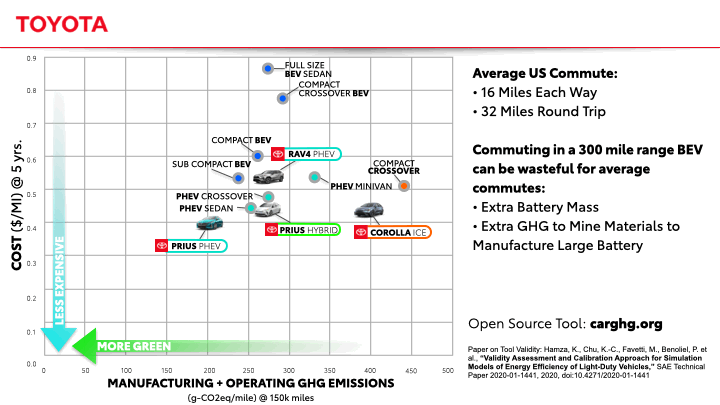Toyota ramps up battery research, expects solid state by 2025

Derryn Wong
13/09/2021
S$19bn pledged for next-gen batteries including solid-state, but most importantly for you? It wants its electric vehicles to have great resale value
In early September, Toyota announced a massive push forward for battery technology to power its electric vehicles (EVs), with a US$14-billion (S$18.8bn) investment that stretches to 2030, and the announcement of ambitious milestones.
The latter includes a broad spread of electrified and zero-emissions cars, the improvement of nickel-hydride and lithium ion battery technology, and the mass market production of solid-state lithium batteries by 2025. The company says it aims to sell a total of eight million electrified vehicles by 2030, with two million of those being battery electric vehicles.
Assault on battery barriers
Toyota’s Chief Technology Officer, Masahiko Maeda announced aims to slash battery costs and to create solid-state batteries in the next decade.
But Toyota doesn’t want to just make cheaper batteries, it wants to – in classic Toyota fashion – make more reliable ones for all of its electrified cars. This means combining ‘safety, long service life, high quality, affordability, and performance’.
“One thing that should make car buyers’ ear prick up: Toyota wants its BEVs to have strong resale value ….it aims for car batteries to retain 90 percent of their charge capacity after a decade on the road.”
One thing that should make car buyers’ ear prick up: Toyota wants its BEVs to have strong resale value too, aiming to make batteries/cars “used with peace of mind always and for their entire lifetime, have high resale value, and contribute to the building of a resource-recycling society.” It aims for car batteries to retain 90 percent of their charge capacity after a decade on the road.

To that end , it’s applied techniques used in its long-standing hybrid battery research, for example the reduction of anode degradation and battery contamination. Even its nickel metal-hydride (NiMH) batteries, seen first in the original Prius and still used in current hybrid systems, will also see increased power density.
The next-gen battery pack, which will be used in vehicles to follow the brand’s first worldwide EV production model the BZ4X, is a solid state battery, which has a solid electrolyte rather than a liquid one, which increases stability, output, capacity, and lowers charging time It will also see significant cost reductions, as well as being cobalt and nickel free. Toyota’s first solid state battery prototype cars have been running since last year, said Maeda.

Toyota’s global EV sub-brand will be BZ, and its first model is the BZ4X SUV – find out when it’s coming
One charge doesn’t fit all

The carmaker sees a major, continued role for petrol-electric hybrid cars and combustion engines, and it’s not alone in that view – Mazda’s technology head Hidetoshi Kudo told CarBuyer that he believes only 11 percent of new cars will be BEVs – but 84 percent of cars sold will still be using ICEs (internal combustion engines) in the form of hybrids. That’s why Mazda could still use rotary gasoline engines in the future.
With those technological levers, one would expect Toyota to make impressive ‘no combustion engines by 20XX’ announcements, but it’s not doing that. Instead of (dramatically) ditching combustion engines altogether, it will sell a range of electrified vehicles including hybrids, plug-in hybrids (PHEV), battery electrics (BEV), and hydrogen fuel cell electric vehicles (FCEV).
Its 2030 electrified vehicle sales target is eight million vehicles, but two million of those are FCEVs and BEVs – in other words, the rest will be hybrids packing a gasoline engine. Toyota says the development of CO2 neutral fuels will help offset emissions from those cars.

READ MORE:
Toyota has come under criticism for focusing on hydrogen fuel cell EVs. We tested the Mirai hydrogen sedan in 2015 and found it a bit miraculous: Gasoline range, EV torque, but nothing out of the tailpipe except water.
But it’s not alone in pushing hydrogen as a viable alternative: Hyundai just announced a massive push toward a hydrogen economy for Korea. Why? Because you can’t charge an electric vehicle in the middle of the ocean…
Toyota has come under criticism for being slow to pivot to BEVs, but that criticism is not totally warranted counters its chief scientist Gill Pratt, who says the company employs thousands of scientists for battery research, and has one of the widest tech patent portfolios on batteries.
“Faced with this uncertainty, our strategy is to place several bets on several promising pathways, including BEVs, and adapt our strategy as we learn. This is the core idea of Toyota’s philosophy of Kaizen and the approach of every investor who diversifies their portfolio to manage uncertainty,” said Pratt, of the company’s vehicle model strategy, in a blog post.

A blanket approach to BEVs isn’t suitable for all situations, since the source of electricity used to power them must be taken into account, amongst myriad other factors. Another example would be developing countries with ‘unclean’ energy generation and no charging infrastructure – a hybrid would offer more lifetime emissions savings than a BEV in that case, and consumers would likely not afford/choose a BEV.
“Carbon is not the enemy, not a particular drivetrain,” adds Pratt, in what could be a veiled dig at BEV ‘EVangelists’. Like any other technology, BEVs are a tool to serve an end, and they have pluses and minuses. What will truly drive the adoption of more sustainable motoring is in fact, far more complex than just a single solution.
- Aion Y Plus Premium 63.2kWh Review: OooOOoh! Square Room!
- The Denza D9 is BYD’s next big thing for Singapore, we went to China to take a look
- Cycle and Carriage Singapore launches new Smart showroom and unveils the Smart #3
- Audi Singapore to premier all-new Lifestyle destination platform by end-2024
- Zeekr X RWD Review: Futuristic urban cruiserweight champ















 on the go
on the go





